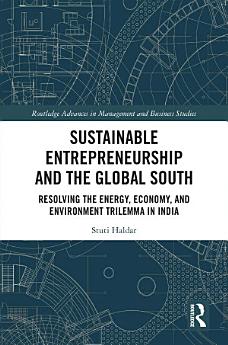Sustainable Entrepreneurship and the Global South: Resolving the Energy, Economy, and Environment Trilemma in India
About this ebook
Through a mixed‐methods approach, the research synthesises diverse data sources, including personal interviews, field observations, policy documents, corporate reports, and secondary data analysis. This comprehensive methodology provides a detailed understanding of how sustainable entrepreneurial niches contribute to energy transitions, offering actionable insights for achieving systemic change.
This book intends to serve as a resource for researchers in sustainability; innovation studies; ecological economics; and Science, Technology, and Society (STS) studies. It also provides practical guidance for policymakers and practitioners working at the interface of energy, environment, and entrepreneurship. By integrating theory and practice, this work calls for collaboration among multilevel stakeholders, particularly in the emerging economy contexts, to co‐develop sustainability‐oriented strategies that drive economic growth while addressing pressing environmental and societal challenges.
About the author
Stuti Haldar is a postdoctoral researcher at CIRCLE (Centre for Innovation Research) Lund University, Sweden, and is affiliated with the Indian Institute for Human Settlements, Bengaluru, India. She has worked extensively on issues of climate change mitigation through transdisciplinary and place‐based approaches. Her work spans multiple areas including sociotechnical transitions, governance, sustainable entrepreneurship and innovation, climate finance, energy and development policy, and justice perspectives.





